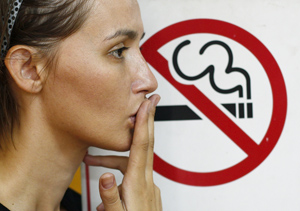OK, so it has been said many times before that smoking is bad – we know that, so why are approximately 21.5% of us still doing it? And if we want to quit, how can we make sure we stay smoke- free for good?
 Why smoke?
Why smoke?
Peer pressure seems to be top of the list of reasons of why people start smoking. A lot of smokers will admit to starting in their teens when health risks were at the back of their mind. Once someone has started smoking the powerful nicotine quickly hooks them into a very hard habit to break; in fact it is stated nicotine is just as addictive as cocaine and heroin.
Nicotine
Cigarettes contain nicotine; we know it is addictive, but what do we really know about it as a chemical?
Well, nicotine is a neurotoxin (a poison that kills nerve cells) that stops animals from eating the tobacco plant. Obviously cigarettes don’t contain enough nicotine to kill a human being, but the toxin works as a stimulant. It takes just 10 seconds for the smoker to get a hit of nicotine from a cigarette, and it is this instant fix that can be so satisfying and be so hard to give up.
Nicotine triggers receptors in the brain responsible for the release of dopamine – the chemical linked to pleasure.
Why give up?
Almost everybody knows the dangerous effects that smoking has on our health and on the health of those around us, but to stop, especially if we have been smoking for half our life, is easier said than done.
The benefits of quitting smoking are numerous. So why is it that we can’t just kick this habit and stay smoke- free?
Quitting smoking could add years to our life, and our chances of getting horrible diseases such as lung cancer and heart disease, would decrease. Our general health could certainly improve: our taste and sense of smell would gradually go back to normal; our skin, hair, nails and bones would get healthier, meaning that we would look better, and the chances of being particularly susceptible to fractures would be lower.
For women, quitting smoking would mean reducing the risk of cervical cancer and for pregnant women, would mean reducing the risk of miscarriages and premature birth.
Our social life would also improve without our smoke-stenched house, car, clothes and breath, not to mention the considerable amount of extra cash we would have available to spend.
Whichever way we look at it, in fact, whether for health, social or financial reasons, quitting smoking and staying smoke-free seems a lot like the right way to go.*
Roadblocks
So why do we stay smoking even when we grow up, know smoking is not ‘cool’ and understand the health risks?
Well, the following roadblocks have been identified as being reasons for people not giving up smoking.
“I smoke to de-stress” – a common misconception is that smoking helps you to relax. Although the dopamine release means smoking has a pleasurable effect on the smoker, the stimulant means that it is not a relaxant or a ‘de-stressor’: in fact it has the opposite physiological effect. Also as the feeling of pleasure wears off, this can leave the smoker even more tense.
“I am a smoker” – for some people, smoking becomes part of their identity. Especially if they started smoking very young, many people hide behind a cigarette and this ‘identifying feature’ is hard to escape.
“It’ll never happen to me!” – most of us have this attitude, and when it comes to smoking, until a medical diagnosis comes in that tells a different story, we all believe it’ll never happen to me!
Withdrawal symptoms – probably the most common reason of all for not giving up smoking is fear of the withdrawal process. It is not nice, it is difficult and a lot of the time people don’t know where to go for help.
So with these roadblocks in mind, we look at how those who want to give up can give up!
Steps to quitting
The first thing we have to do is acknowledge that smoking is bad for us and maybe do a little research on the dangers of it; this way we allow our mind to open to the possibility of quitting.
The next step is to focus on the reason for quitting. Why do you want to give up? Remind yourself of this as you will need to focus on this reason when you take the next step.
Smoking is an addiction which has physical and psychological control on us and we will need a lot of self- discipline, strong attitude and determination when we decide and commit to quitting.
A lot of people successfully quit smoking and there are a lot of things out there that can help, but whichever method you choose, you will need hard work and determination.
Also on the journey through quitting, we need the help and encouragement of family and friends; research shows that people with a good backing from family and friends have a much higher chance of quitting smoking than people relying on willpower alone. If you don’t have this support or encouragement there are great online communities, face-to-face support groups and telephone support available, see below.
Getting help
So you have decided to quit, you are determined to take control, what are your options now? Cutting down
This is an option you may favour if you are a heavy smoker, in which case there is help available in the form of nicotine replacement therapy that can help you cut down if you are not able to take the plunge straight away. Going ‘cold turkey’
This can be the hardest way to stop, but some circumstances dictate that it might be the way for you; if you are pregnant, for example, you may find this the best option. Talk to a GP or look at the end of this article for other sources of support, because you are going to need a lot of strength and willpower to quit ‘cold turkey’. (I know because I did it when I was pregnant with my son!)
Nicotine Replacement Therapy (NRT)
NRT comes in many forms, and it is said that it can increase your chances of quitting by up to four times. These days there is a vast array of choice: lozenges, inhalers, sprays, patches, gum. There is literally something for everyone wanting to quit. Whether it is something to occupy your hands while you control your cravings (such as an inhaler), or something to control your cravings all day (slow release patches), there really is a great range of products, many available on prescription as well as over the counter. Speak to your GP or call one of the helplines below for more information. Medication
Zyban and Champix are different options your GP may like to try with you depending on your medical history, please ask at your local surgery for more information on these options. Support groups
There are many support groups run by charities/ government bodies/ the NHS; depending on where you live there will be different groups in your area. Search online or ask your GP/ pharmacist who will be able to give you local information. You can also call Quitline who can advise you of the options in your area. Some areas offer one-to-one support as well as group therapy.
Groups can help give you support, encouragement and an understanding of what you and others in the same circumstance are going through.
Exercise and diet
It is quite common for people who give up smoking to find they eat a little more; this can be because cigarettes can act as an appetite suppressant, or because people may eat as a way of trying to satisfy the cravings. It is also very easy to replace one habit with another.
It is very important to try to eat healthy food when giving up smoking. We would not recommend going on a diet at the same time as giving up smoking, but do try and eat a good balanced diet.
I remember going for a long walk after giving up smoking and for the first time realising my legs were more tired than my lungs; for the first time I felt my breathing was normal and that I could do things without getting breathless. This in itself was a great encouragement to exercise!
QUIT, in conjunction with fitness experts, have designed an exercise programme specifically for smokers to help you quit – go to www.quit.org.uk for more information.
You may also want to join a community like Planet of the Vapes:
Resources
www.smokefree.nhs.uk
www.quit.org.uk
www.bhf.org.uk
www.cancerresearchuk.org
Helplines
Quitline: 0800 00 22 00
Further information
For more information on Addictions, please visit:







